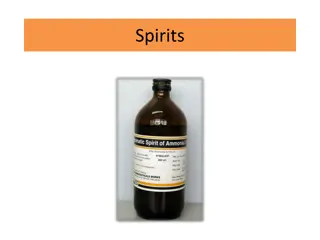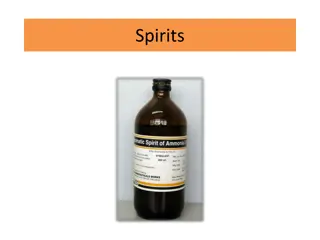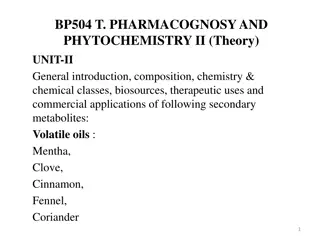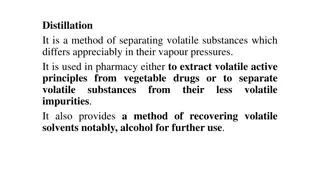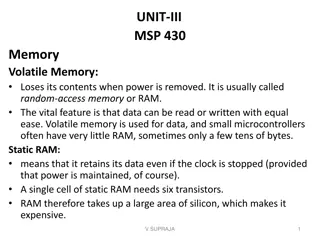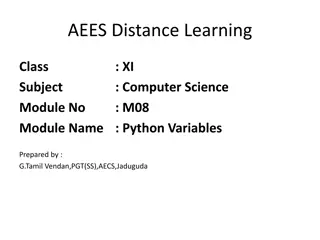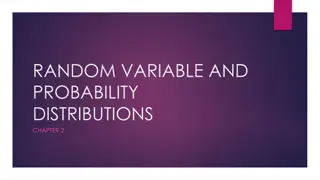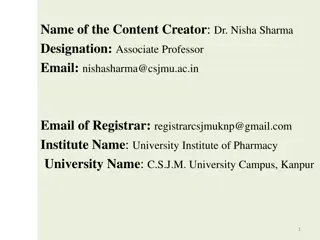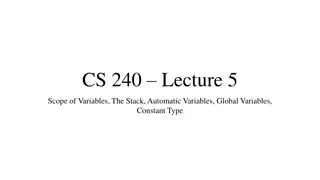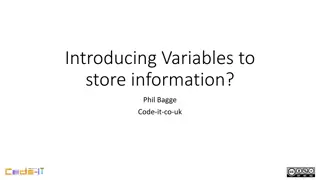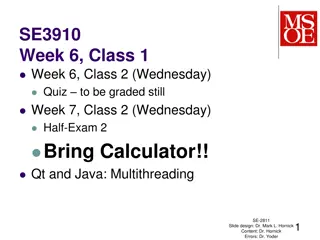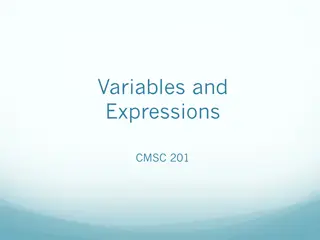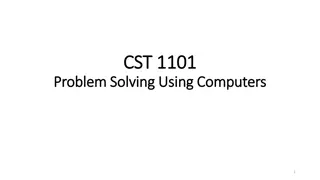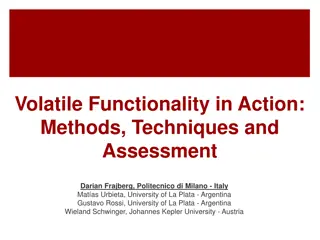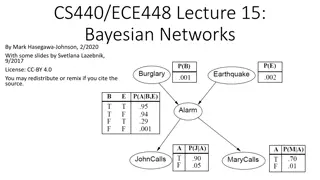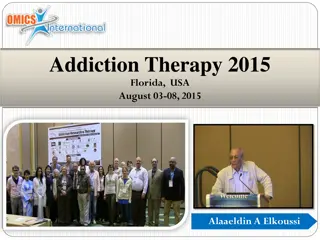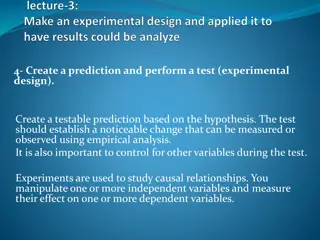Understanding Dummy Variables in Regression Analysis
Dummy variables are essential in regression analysis to quantify qualitative variables that influence the dependent variable. They represent attributes like gender, education level, or region with binary values (0 or 1). Econometricians use dummy variables as proxies for unmeasurable factors. These
3 views • 19 slides
Understanding Variables in Research Studies
Variables in research studies play crucial roles in examining relationships and drawing conclusions. They include independent variables that influence outcomes, dependent variables affected by independent ones, moderator variables that strengthen or weaken relationships, intervening variables lying
7 views • 34 slides
Understanding Spirits and Their Uses in Therapeutics and Flavoring
Spirits, also known as essences, are alcoholic or hydro-alcoholic solutions containing volatile substances. They can be classified based on therapeutic or flavoring purposes. These solutions are prepared by distillation or dissolving volatile substances in alcohol, with varying alcohol content. Spir
4 views • 17 slides
Understanding Variables and Control in Research Design
In research design, variables play crucial roles as either dependent or independent factors, with extraneous variables potentially affecting study outcomes. Controlling for extraneous variables is essential to attribute effects solely to the independent variables. Research hypotheses aim to test pre
0 views • 6 slides
Understanding Pharmaceutical Degradation: Types and Factors
Pharmaceutical degradation refers to the process of a formulation in a specific container losing its chemical, microbiological, therapeutic, physical, and toxicological specifications. It can be categorized into physical, chemical, and microbiological degradation. Physical degradation alters the dru
1 views • 50 slides
Understanding Spirits: Types and Uses
Spirits are alcoholic or hydro-alcoholic solutions of volatile principles, mainly volatile oils, classified into therapeutic and flavoring types. They are prepared by distillation or dissolving volatile substances in alcohol, with varying alcohol content. Proper storage in light-resistant containers
1 views • 20 slides
Volatile Oils in Pharmacognosy and Phytochemistry: Composition, Chemistry, Uses
Volatile oils, also known as essential oils, are derived from terpenes and their oxygenated compounds. These oils possess characteristic odors and are extracted from plants through various methods like hydro-distillation and steam distillation. They are commonly used as flavoring agents, perfumes, a
0 views • 29 slides
Understanding Memory Organization in Computers
The memory unit is crucial in any digital computer for storing programs and data. It comprises main memory, auxiliary memory, and cache memory, each serving different roles in data storage and retrieval. Main memory directly communicates with the CPU, while cache memory enhances processing speed by
1 views • 37 slides
Distillation Process and Applications in Food Industry
Distillation is a separation process used in the food industry to separate components in a mixture based on their volatility. It involves vaporization, condensation, and re-evaporation to achieve separation. Steam distillation is a method where steam is used to reduce boiling temperatures for safe s
1 views • 13 slides
Distillation: A Method for Separating Volatile Substances
Distillation is a method used in pharmacy to extract active principles, separate substances, and recover solvents. Simple distillation involves vaporizing a liquid, condensing the vapors, and collecting the liquid. It is commonly used for separating liquids from non-volatile solids under atmospheric
1 views • 69 slides
Understanding Variable Declarations and Conversions in Java
Properly declaring variables in Java is essential before using them. This chapter covers different types of variable declarations, including class variables, instance variables, local variables, and parameter variables. It also explains the concept of type casting and the importance of explicitly de
1 views • 23 slides
Understanding Inhalation Anaesthetics in Veterinary Pharmacology & Toxicology
Explore the world of inhalation anaesthetics in veterinary medicine, from the concept of MAC to the classification of gaseous and volatile agents. Learn about blood/gas and oil/gas partition coefficients, along with the properties of popular volatile anaesthetics like Ether, Halothane, and Methoxyfl
1 views • 15 slides
Understanding Random Variables and Their Applications in Various Fields
Random variables play a crucial role in statistics, engineering, and business applications. They can be discrete or continuous, depending on the nature of the outcomes. Discrete random variables have countable values, while continuous random variables can take on any real number. This article explor
0 views • 6 slides
Understanding Different Types of Memory in MSP430 Microcontrollers
MSP430 memory includes volatile RAM, dynamic RAM, nonvolatile ROM, EPROM, and flash memory. Each type has unique characteristics such as data retention, ease of read/write, cost implications, and methods of programming and erasing. Microcontrollers utilize various memory types based on requirements
0 views • 73 slides
Python Variables: Understanding Declaration, Naming Rules, and Assignment Operators
Python variables are essential for storing values in reserved memory locations. This article covers the basics of variables in Python, including declaration, assigning values, naming rules, multiple assignments, deleting variables, and assignment operators. Learn how to create, name, and manipulate
0 views • 11 slides
Understanding Variables in Educational Research
Variables in educational research play a crucial role as symbols of events, traits, or characteristics that can be measured and categorized. Different types of variables such as change, effect, and outcome variables are essential in studying causal relationships. Dependent variables represent outcom
6 views • 17 slides
Preparation Methods and Uses of Aromatic Water in Pharmacy
Aromatic water is a liquid pharmaceutical preparation containing volatile oils or essential oils. It is used as a pleasant medium for administering water-soluble drugs. Various preparation methods include distillation, solution, alternate solution, and dilution methods. Distillation method is used f
2 views • 17 slides
Gas Chromatography: Introduction, Theory, Instrumentation, Derivatization
Gas chromatography is a powerful analytical technique used for separating and analyzing volatile compounds. It involves a mobile gas phase passing through a stationary phase, with components in the mixture interacting differently, resulting in separation. The technique dates back to 1905 and has evo
0 views • 12 slides
Understanding Random Variables and Probability Distributions
Random variables are variables whose values are unknown and can be discrete or continuous. Probability distributions provide the likelihood of outcomes in a random experiment. Learn how random variables are used in quantifying outcomes and differentiating from algebraic variables. Explore types of r
0 views • 13 slides
Optimizing Memory and Storage Support for Non-Volatile Memory Systems - JanusJanus
JanusJanus focuses on optimizing memory and storage support for non-volatile memory systems by parallelizing sub-operations and pre-executing based on dependencies. This approach enhances performance, achieving 2X faster results compared to serialized baselines. The system addresses the critical pat
0 views • 50 slides
Understanding Variables in Physics: A Comprehensive Guide
This presentation introduces and explains different types of variables in Physics, emphasizing the concepts of independent, dependent, and control variables. It provides practical examples and tips for identifying variables in experiments, aiming to enhance students' understanding of scientific meth
2 views • 24 slides
Essential Insights on Volatile Oils and Their Properties in Pharmacognosy
Explore the fascinating world of volatile oils in pharmacognosy with Dr. Nisha Sharma, an Associate Professor at C.S.J.M. University. Learn about the physical and chemical properties of volatile oils, their classification based on functional groups, and examples of different types of volatile oils u
0 views • 12 slides
Kaseya Fundamentals Workshop - Agent Procedures and Variables Overview
Discover the key aspects of Agent Procedures and Variables in Kaseya Fundamentals Workshop, including Managed Variables, Global Variables, and Public Variables. Explore examples of Agent Procedures and learn about Application Deployment, Windows Registry Modification, and more. Gain insights into Pr
0 views • 23 slides
Understanding Memory Stack and Variable Scope in Computer Architecture
This content delves into the scope of variables, the stack in memory architecture, automatic and global variables, and the concept of constant types. It explains the functioning of the stack, how function calls are managed, and the allocation of variables within stack frames. The relationship betwee
0 views • 18 slides
Understanding Variables in Programming
Variables in programming act as containers to store information. They are essential in languages like Scratch to hold values. Computers use labels to identify variables, and values stored inside can be accessed by reading the labels. Programming utilizes commands like "var" to define variables and s
0 views • 23 slides
Understanding the Concept of Volatile Variables in Multithreading
In computer programming, volatile variables play a crucial role in multithreading scenarios. They ensure that changes made by one thread are visible to other threads by bypassing caching mechanisms. This article explores the significance of volatile variables and their use cases in Java and C, shedd
0 views • 17 slides
Understanding Volatile Oils in Pharmacognosy: Properties, Composition, and Uses
Volatile oils, also known as essential oils, are complex plant products containing volatile principles. They are colorless but may darken over time. Immiscible with water, they have distinct odors and tastes, and are soluble in organic solvents. Officially sourced from plants, volatile oils have the
0 views • 13 slides
Introduction to Variables and Expressions in Python
Today we start Python! Learn about variables, how to create them, assign values, and perform mathematical operations using variables in Python. Understand the rules for naming variables and how they are essential for storing and managing information in your programs. Explore different types of varia
0 views • 16 slides
Understanding Variables in Programming and Memory Concepts
Variables are essential in programming as they allow temporary storage of data within a program. This content delves into the concept of variables, their importance, and how they function in memory. It explains the relationship between variable names and memory locations, discusses data types, and h
0 views • 19 slides
Understanding Variables in Economics
Variables in economics, such as dependent, independent, endogenous, and exogenous variables, play a crucial role in analyzing economic phenomena. Dependent variables are influenced by changes in other variables, while independent variables are not. Endogenous variables are internal and need to be pr
0 views • 8 slides
Understanding Volatile Oils in Pharmacognosy: Properties, Uses, and Applications
Volatile oils, also known as essential oils, are hydrophobic liquids extracted from plants containing volatile chemical compounds. These oils have diverse physical and chemical properties, making them valuable in various fields like aromatherapy, perfumery, and therapeutics. Learn about the differen
0 views • 12 slides
Understanding Different Types of Memory Technologies in Computer Systems
Explore the realm of memory technologies with an overview of ROM, RAM, non-volatile memories, and programmable memory options. Delve into the intricacies of read-only memory, volatile vs. non-volatile memory, and the various types of memory dimensions. Gain insights into the workings of ROM, includi
0 views • 45 slides
Managing Volatile Functionality in Web Applications
Explore the challenges of incorporating and removing volatile functionalities in web applications post-deployment. Learn about the impact on code quality, performance, and project costs, and discover methods and techniques for efficient management. Case studies like Black Friday promotions illustrat
0 views • 31 slides
The Art of Variables in Programming and Delicious Sandwiches
Explore the concept of variables in programming using fun analogies of creating a PBJ sandwich and a s'more. Understand how variables act as containers to store important information in code. Discover the ingredients needed for each delicious treat and learn how variables play a crucial role in both
0 views • 5 slides
Understanding Volatile Oils in Pharmacognosy: Properties and Applications
Volatile oils, also known as essential oils, play a crucial role in pharmacognosy due to their complex composition and therapeutic benefits. These oils are immiscible with water but soluble in organic solvents, and their chemical composition includes terpene derivatives and aromatic compounds. They
0 views • 11 slides
Understanding Secondary Organic Aerosol Formation from Volatile Chemical Products
This research explores the impacts of volatile chemical products (VCPs) on secondary organic aerosol (SOA) formation. By identifying chemical tracers, assessing VCP contributions, and analyzing VOC emissions in different cities, the study aims to enhance our understanding of air quality and sources
0 views • 16 slides
Understanding Bayesian Networks for Efficient Probabilistic Inference
Bayesian networks, also known as graphical models, provide a compact and efficient way to represent complex joint probability distributions involving hidden variables. By depicting conditional independence relationships between random variables in a graph, Bayesian networks facilitate Bayesian infer
0 views • 33 slides
Understanding Inhalant Abuse: Risks, Effects, and Prevention
Inhalant abuse is a widespread issue, with volatile substances being inhaled to achieve psychoactive effects. This form of substance abuse poses significant toxicological and social hazards, often affecting marginalized populations such as neglected street children. The accessibility, affordability,
0 views • 44 slides
Designing a Controlled Experiment: Steps and Considerations
Experimental design involves systematically testing hypotheses by manipulating independent variables and measuring their effects on dependent variables. This process includes considering variables, designing treatments, assigning subjects to groups, and planning measurements. To ensure valid conclus
0 views • 11 slides
Understanding Global and Local Variables in Programming
Global and local variables play essential roles in programming. Global variables can be accessed by all functions within a program, while local variables are restricted to specific functions. This text explains the concepts with analogies and code examples to illustrate how variables are scoped in p
0 views • 8 slides


